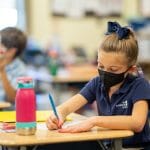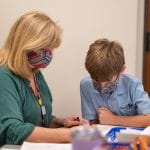The summer holidays are often a welcome break for teachers, parents, and students to enjoy some free time and relaxation. However, with decades of research highlighting the potential consequences of summer learning loss, parents and educators may feel a sense of panic as the summer approaches. But the loss of academic skills is nothing to worry about as long as parents know what to look for! All of the knowledge that students have acquired during the school year can continue to grow over the summer, even if they aren’t in the classroom. Read below to learn more about summer learning loss and how to keep students’ skills sharp through the break.
What is summer learning loss?
Summer learning loss is the idea that students lose a certain amount of knowledge or expertise when they are not in school during the summer holidays. Also known as the “summer slide,” this concept has been around for generations and has been studied consistently over the years. While notable gaps between students are primarily formed during the years before children enter school, some research suggests that these gaps can grow during the summer, especially for older and lower-income students. This means that students who are already struggling during the school year may fall further behind their peers during a break from school. The precise amount of skills lost during the summer is disputed among experts, but it is understandable that parents and teachers may worry about what skills a child may be losing during the summer months.
Make learning fun.
Learning can continue throughout the summer months, even if it doesn’t look like sitting at a desk in a classroom. With resources for dyslexic students and other struggling readers that make reading practice fun, kids can expand their reading skills without them even realizing it. In addition to practicing critical skills like reading and writing, young learners can also use the summer to develop skills less related to academics. Social skills, creativity, and physical development can also be part of a child’s learning during the summer, and parents can tie these skills into academics. For example, for every 30 minutes a child spends playing outside or spending time with a friend, parents may encourage them to spend 30 minutes reading independently or listening to an audiobook together before bed.
Don’t try to replicate school.
The point of the summer break is just that–for students to take a break! Parents can prevent summer learning loss without needing to engage in educational activities for the eight or more hours that students typically spend at school during the year. Instead of replicating how the school day is structured, parents can sprinkle in fun activities throughout the day while still giving students plenty of time to relax and recharge. For example, cooking can be an excellent way to encourage students to practice a wide range of skills through the summer! Children can practice fractions by helping with measurements, improve reading skills by reading cooking instructions aloud, and understanding scientific processes by following the precise steps of a recipe in order.
Be willing to adapt.
Parenting is mostly about adapting to new situations as they come up, and preventing summer learning loss is no exception! At-home learning should look different for each student, depending on their age, abilities, environment, and countless other factors. Students can be more impacted by summer learning loss if they are already struggling in a subject, so parents should adjust their focus over summer break to prioritize the topics their children may need more practice with. Don’t underestimate how beneficial a trip to a museum or zoo can be or how much a child can learn through an educational television program. Every family’s summer looks different, and continued learning can happen everywhere, from a summer camp to a family vacation, as long as parents and children are willing to try!
The idea of summer learning loss can feel scary for teachers, parents, and students, but the first step to addressing this phenomenon is learning more about it. ReadSource is passionate about giving teachers and parents the resources and knowledge they need to help students do their best. Summer break can be the perfect opportunity to help struggling readers keep up with their developing skills. Explore our available teacher training courses and online resources so you can support dyslexic students and struggling readers in and out of the classroom.








Leave a Reply